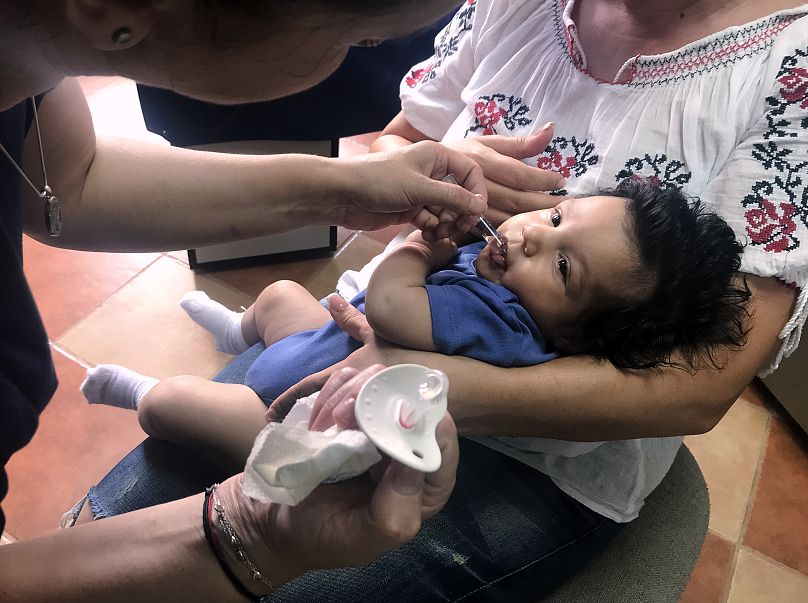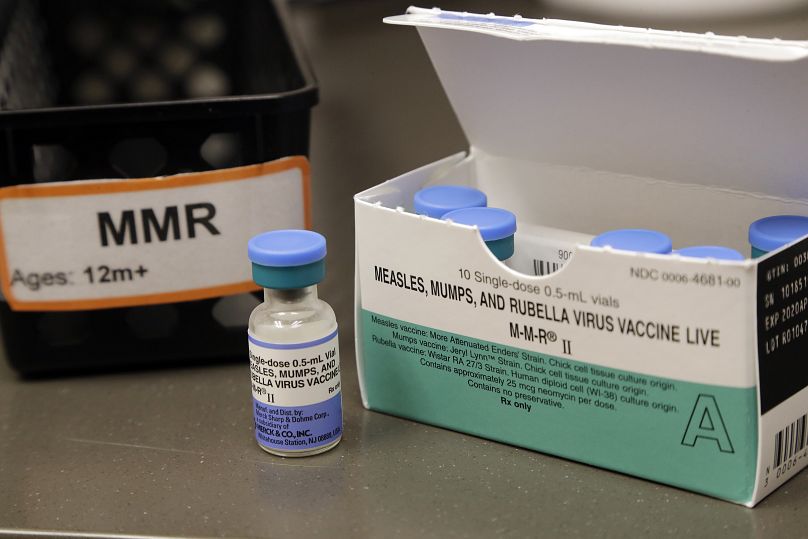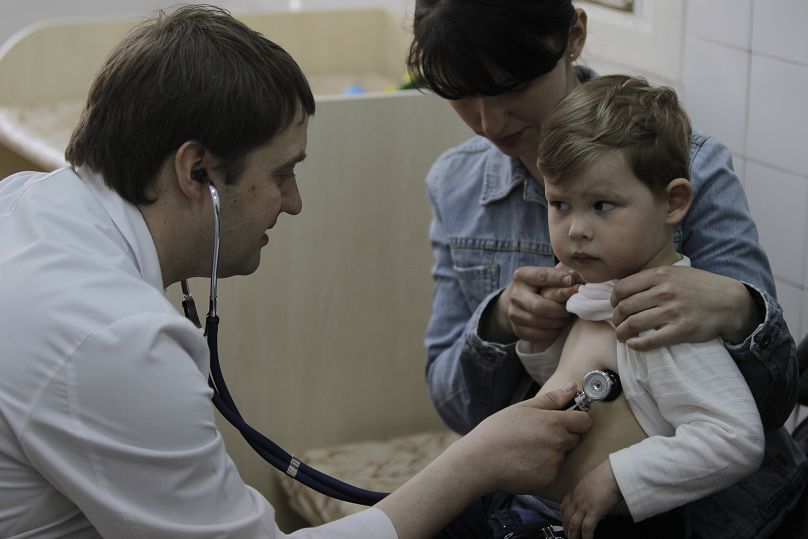The WHO told Euronews it is "afraid" that fewer Europeans got routine vaccinations for serious diseases, like measles, during the pandemic, which could lead to outbreaks down the line.
Think back to spring 2020.
European nations had fallen into lockdowns like dominoes, so much about COVID was still unknown — many of us were still washing our vegetables when we got back from the supermarket, and, crucially, we weren't aware of the extent to which the virus affected children.
Bearing this in mind, if you were a young parent, would you take your baby to a doctor's surgery to get vaccinated against the likes of measles, meningitis, or hepatitis B?
The World Health Organisation (WHO) told Euronews it is concerned that many didn't, with the body saying it is "afraid" fewer Europeans got routine vaccinations for serious diseases during the pandemic.
"From the preliminary data we are seeing and information we are receiving from national public authorities, we are afraid that routine immunisation coverage decreased in 2020," Dragan Jankovic, technical officer in WHO’s Europe office for vaccine-preventable diseases and immunisation said.
Herd immunity — not just protection that relates to COVID
"Herd immunity" became the buzzword as the pandemic arrived on Europe's shores, but it doesn't just apply to COVID, nor does it necessarily mean swathes of a population getting ill — it can also be achieved via vaccination.
Also known as "population immunity", the concept describes the indirect protection from an infectious disease that happens when a population is immune either through vaccination or through previous infection and it is essential in preventing outbreaks of highly-contiguous diseases like measles.
To safely achieve herd immunity against diseases, COVID-19 included, a substantial proportion of a population needs to be vaccinated, lowering the overall amount of virus able to spread in the population as a whole.
The percentage of people who need to be immune in order to achieve herd immunity varies with each disease and for it to work against measles, for example, 95% of a population needs to be vaccinated, according to the WHO's thresholds.
The remaining 5% of people will be protected by the fact that measles will not spread among those who are vaccinated.
A dip in the number of people getting vaccinated is exactly what Dr Farzana Hussain, GP at the Project Surgery in East London, observed in the patients at her practice.
"When the first lockdown hit on March 23, I could see the rates of children coming for their childhood vaccinations dropping quite quickly," she told Euronews, with the rates of vaccination for older children plummeting to below 50%.
"This was worrying as measles had already in the last few years had a little pocket of resurgence in some areas in London," Hussain added.
So she took action. Because she had received feedback that parents, specifically those with young babies, were worried about bringing their children to her surgery, she set up a "drive-up" facility in front of the building.
Parents brought their babies in the car or simply wheeled their pushchairs under the surgery's front porch and a nurse would come out to give them their vaccinations. Face-to-face time was reduced to two minutes, with the rest of the appointment carried out over the phone, and the parents didn't have to step foot inside the hospital.
By the end of June, the surgery had climbed back to a rate of over 90% for our 2-year-olds and just under 90% for 5-year-olds, which is just below the WHOs target.
"There has never been so much opportunity to innovate as during the pandemic," Hussain said. "In the past there would have been red tape but everyone was keen to cut red tape and say 'yes'".
What’s at stake?
While there have been some cases of other diseases in Europe over the last few years, like diphtheria and pertussis, measles is the one that keeps doctors up at night.
The DPT vaccine (against the three infectious diseases diphtheria, pertussis, and tetanus) has been used for a long time and is well-established in all of the countries in the region, according to Jankovic.
Measles is one of the world's most contagious illnesses, so much so that around 9 out of 10 people who are not protected will become infected following exposure to the virus.
The serious disease, which is caused by a virus, can result in a runny nose, a cough, red and watery eyes, small white spots inside the cheeks and rash.
Most measles-related deaths are caused by complications associated with the disease but serious complications are more common in children under the age of 5, or adults over the age of 30, which is why two doses of the MMR (measles, mumps and rubella) vaccines are usually given aged one and around the age of three.
Ear infections and diarrhoea can both occur as a result of measles, while serious complications include pneumonia and encephalitis, an inflammation of the brain tissue.
Outbreaks are declared when the number of cases of an illness reported in an area is higher than the expected number of cases.
And the threat of a measles outbreak in Europe is not imaginary — a surge in measles cases began in 2017 and peaked in 2019, when over 100,000 cases were reported, according to the WHO.
Cases on the continent tripled between 2017 and 2018, soaring to 82,596.
WHO said the main driver of the hike in measles cases from 2016, which was also seen in data on instances worldwide, to a failure to vaccinate children on time with two doses of measles-containing vaccines (MCV1 and MCV2).
"There is a great success story surrounding measles - so many more people than ever are immunised but from time to time we have outbreaks reaching the level of thousands of cases, which are unexpected and also unacceptable," Jankovic said.
Outbreaks in 2018 were recorded in Ukraine (53,218), Serbia (5,076), France (2,913), Italy (2,517), the Russian Federation (2,256), Georgia (2,203), Greece (2,193), Albania (1,466) and Romania (1,087).
Ukraine — some vaccinations going ahead but at what cost to parents?
With Europe's worst outbreak of measles in recent times, Ukraine has allegedly seen parents getting fake vaccination certificates to avoid having their children immunised.
But while Dr Fedir Lapiy, a pediatric immunologist from Kyiv, told Euronews in 2019 that fears and mistrust in doctors were one of the drivers for the move, studies have shown the majority of Ukrainian parents support vaccinations.
The country also faced a critical shortage of vaccines in 2010 and, despite the situation getting better, a majority of parents who Euronews spoke to had got their children inoculated in private facilities during the pandemic.
"A private clinic dedicated one of it its units specifically to vaccinations during the first lockdown and it was a good chance to vaccinate kids who were at home at the time," Roksolana Avramenko, mother to one boy who is at primary school in Kyiv, told Euronews.
But now her son has returned to the classroom, she said she is puzzled about how vaccinations are supposed to go ahead amid "constant contact cases of COVID or carriers (of the virus) in the classroom".
Vadym Kulichenko, an associate professor at Kyiv National University of Construction and Architecture, told Euronews he got his children vaccinated with their planned MMR jabs following a call from his GP and had "no problems".
But the father of 6-year-old twin boys and an older son who is 11, said this was not the case for the flu vaccine: "We wanted to get vaccinated against the flu in October 2020, but couldn’t buy the vaccine. There is a deficit."
"My baby was 13 months old at the beginning of the pandemic and most of our visits to our doctor were cancelled, but for the vaccinations, we had the green light," Iryna Znas, an editor from Kyiv, said.
"All the state mandatory vaccines and all additional ones at the parents’ expense they did without problems: The lack of vaccines was not felt, but most were bought at my own expense so I could do one combined injection for the baby and not three to five separate ones at a time."
Olesia Maliuvanchuk, a mother of two from Lviv, said she didn't feel the effects of the pandemic or any preexisting barriers to vaccination in Ukraine.
“I don’t feel like I was really affected," she said. "For vaccinations, we had a separate entrance to the medical centre during this period."
Since the beginning of the pandemic, she said she has vaccinated both her children against at least nine illnesses, some of which are combined jabs or needed several doses, and her area is considered a "red zone" for COVID rates.
Italy — 1 in 3 parents postponed their child's vaccinations during lockdown
Having also seen an outbreak of measles in recent years, the Italian Academy of Pediatrics (Società Italiana di Pediatria) delved into the effects of COVID on childhood vaccination with a survey, Aurea Oradini, a medical resident specialising in inoculation scepticism at Vita-Salute San Raffaele University in Milan, told Euronews.
Between April 28 and June 8, 2020, they asked 1,500 parents of children aged 0-11 years old if they had postponed a routine vaccination due to Coronavirus and one in three said they had.
The most common reasons for parents choosing to postpone the vaccinations were a lack of safety due to the pandemic (44%), the vaccination centre was closed (13%), and the vaccination centre postponing the appointment (43%).
Almost half of the parents interviewed (46%) said that they hadn't received new guidelines on how to vaccinate their children safely during the pandemic.
How much damage has the pandemic wreaked on immunisations?
WHO's monthly case reports for measles in Europe for the first half of last year show a significant decrease in transmission compared to 2018 and 2019, with 12,028 instances reported between January–June 2020.
But Jankovic cautions that this figure could be an underestimation and influenced by a number of factors relating to the pandemic, including children not going to school so not getting infected and disruptions in laboratory surveillance for measles during the peak of COVID-19.
"Kids sat at home and only humans carry the virus, or we could've had huge outbreaks and no was reporting cases," he said.
The number for early 2020 is also still higher than for the same period in 2016 and 2017.
And the fact remains that if children are not having their routine immunisations for any of the diseases Europe vaccinates against, the impact will be felt in the future rather than immediately.
An Italian medical association also ran a campaign encouraging adults to get the flu, pneumonia, or DTaP jab while they were already at their GP.
The motivation behind the initiative was to optimise doctor appointments during the pandemic and reduce the differential diagnosis of COVID-19 with other diseases.
The SIMG (Società Italiana di Medicina Generale e delle cure primarie) used the slogan “turn the other shoulder”, rather than a patient 'turning the other cheek', to encourage patients not to ignore their vaccines.
The preliminary data WHO has received and information it has got from national public authorities points to the fact that routine immunisation coverage decreased overall in 2020 due to disruptions linked to the COVID pandemic.
Jankovic said the WHO and most European countries don't yet know the true level of damage that the COVID pandemic has wreaked on immunisations for other diseases.
The agency does not have complete datasets for 2020 that it has been able to analyse for all of the 53 countries in the WHO European Region.
There are vast differences between countries at an administrative level on how the information is collected and gaps in data for often the most at-risk populations who don't have access to vaccines for reasons that are different in each country.
What's more, even if countries were still carrying out routine immunisations during the pandemic, reporting on it may not have been their highest priority, Jankovic reasoned.
Almost 41 countries worldwide have already or risk putting off their measles campaigns for 2020 or 2021, which increases the risk of bigger outbreaks around the world that could be brought into Europe.
Jankovic's department asks countries to keep up with immunisations and "constantly weigh up what is the risk of the COVID pandemic and the risk of other diseases, keep up all services as a priority and if you have outbreaks of vaccine-preventable diseases, react to them immediately".
The overriding message is that countries should take stock and catch up on all the vaccines that were delayed or cancelled, in all areas of their populations, as "most have gaps" in their coverage.
When it comes to measles the WHO's target is to completely eradicate the illness, and we are "running the last 100 metres of the marathon", Jankovic said.
"COVID has shown us what happens if we don't get vaccinated against a disease," he added. "This could happen for any single disease, if you don't vaccinate and you have an outbreak, we will be in a similar situation."
With research by Farah Gomaa
Every weekday at 1900 CET, Uncovering Europe brings you a European story that goes beyond the headlines. Download the Euronews app to get an alert for this and other breaking news. It's available on Apple and Android devices.














